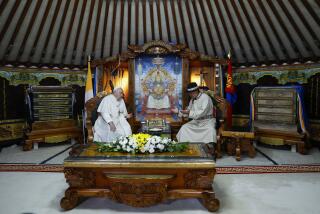Latvians Hear Pope’s Reconciliation Call : Religion: ‘Hope is reborn,’ John Paul tells worshipers. He says world recognizes aspirations of Russian settlers there.
- Share via
RIGA, Latvia — Journeying to a Protestant piece of the former Soviet Union, Pope John Paul II came to Latvia on Wednesday with a message of understanding and reconciliation for a newly independent republic where Russia still looms uncomfortably large.
Big, friendly crowds greeted the Polish pontiff here in the capital of this West Virginia-sized nation, where most of the 2.7 million people are Lutherans, Russian settlers are a powerful but disenfranchised minority and a large garrison of Russian troops hangs over the national psyche.
For the record:
12:00 a.m. Sept. 10, 1993 For the Record
Los Angeles Times Friday September 10, 1993 Home Edition Part A Page 3 Column 1 Metro Desk 2 inches; 65 words Type of Material: Correction
Latvian citizenship--A report in Thursday’s editions about Pope John Paul II’s visit to Latvia misstated the Baltic republic’s criterion for citizenship and hence eligibility to vote. Residents of the republic, whether Latvian or of another ethnicity, may vote if their ancestors lived in independent Latvia before it was formally annexed by the Soviet Union in 1940. In June elections, as many as 25% of those who had the right to vote were not of Latvian ethnicity.
Praying with leaders of other faiths in Riga’s Lutheran cathedral, the Pope said all religions had shared “the experience of the catacombs” under Soviet repression. In the aftermath, he applauded “the new ecumenical springtime.” God’s call for unity, he said, “is growing more powerful than the temptation to separation and division.”
To Catholics who flocked to an outdoor Mass on a brisk afternoon, the pontiff hailed the “new creation” of faith after decades of persecution.
Having “endured the cross of persecution, exile and martyrdom,” the Pope told Latvians, “you . . . are now called to confirm your strength through your generous, total offering of fraternal forgiveness. This courageous, farseeing gesture of fraternal peace will thus become a pressing invitation to repentance and a conversion of heart for those who caused your suffering too.”
Latvia, annexed to the Soviet Union in 1940, suffered Nazi occupation in World War II and Stalinist persecution in its aftermath. Hundreds of thousands of Latvians were deported and large numbers of Russians settled on Latvian lands.
Today in Latvia, which regained its independence in 1991, the settlers and their kin make up around 40% of the total population.
Many Latvians view the Russians as colonizers and want them to leave. In the new republic’s first elections last June, the vote was denied to all who could not document a Latvian ancestor at the time of the 1940 annexation.
Estonia, which the pontiff visits Friday on his way home, has also restricted the citizenship rights of Russian settlers, triggering angry protests from Moscow.
John Paul is not a fan of split-level citizenships. Speaking to the diplomatic community in Vilnius, Lithuania, on his first stop in his weeklong Baltic swing, the Pope noted that the world community “recognizes the aspiration of citizens of Russian origin to enjoy full human rights” in their adopted homelands.
The pontiff did not publicly comment Wednesday on the sensitive question of about 16,000 Russian troops still in Latvia, although a spokeswoman for President Guntis Ulmanis said the two leaders discussed the issue.
“The Pope said he understood the situation and that all the troops should leave Latvia,” Anta Busa said.
Vatican officials could not immediately confirm the exchange. But they noted that John Paul recently told neighboring Estonia’s ambassador to the Vatican that the continued presence of around 5,000 Russian troops there was complicating the search for modernization.
Many of the 20% of Latvians who are Catholic live in the southeast of the country, and the Pope will visit them today with a Mass in the provincial agrarian town of Aglona.
More to Read
Sign up for Essential California
The most important California stories and recommendations in your inbox every morning.
You may occasionally receive promotional content from the Los Angeles Times.













